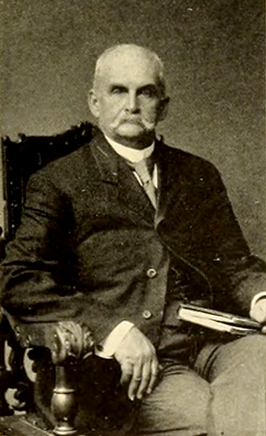8 May 1839–13 Mar. 1909

Alexander Quarles Holladay, educator, was born in Spottsylvania County, Va., the son of Alexander Richmond and Patsy Quarles Poindexter Holladay. He grew up in an area where his ancestors had lived for five generations. His father was for several years a member of the Virginia General Assembly and served two terms in the U.S. House of Representatives (1849–53). His great-grandfather, Lewis Holladay, was commissioned a lieutenant of militia in 1775 and participated in a number of campaigns during the Revolutionary War.
Young Holladay received his preparatory education in the schools of Richmond and in 1857 entered the University of Virginia, where he studied languages, philosophy, and law. In 1859 he went abroad to travel and pursue special studies at the University of Berlin. With the outbreak of the Civil War in the spring of 1861, Holladay returned to Virginia where he volunteered as a private in the state militia. One month later, on 25 May 1861, he was commissioned a second lieutenant in the Nineteenth Virginia Infantry. He participated in many early battles of the war before he was stricken with typhoid fever. Although his recovery was slow, Holladay eventually returned to active service. At one time during the war he served on the staff of General Braxton Bragg. He was paroled at Greensboro in April 1865.
After the war, Holladay studied law under his father in Richmond; in 1870, they formed the law firm of Holladay and Holladay. The same year he was elected to the Virginia senate, serving two terms (1871–75). After his father's death in 1877, Holladay gave up the practice of law and entered the field of education. He taught in the Richmond schools until 1881, when he was elected principal of Stonewall Jackson Institute at Abingdon, Va. In 1884, Holladay was appointed head of the Department of English Literature at Florida Agricultural College, Lake City (forerunner of the University of Florida). He was named president of the college in 1885 and served in that capacity until 1888. He remained in Lake City one more year as professor of English.
In the summer of 1889, Holladay applied for the professorship of English in the new North Carolina College of Agriculture and Mechanic Arts (now North Carolina State University). On 30 Aug. 1889, the board of trustees unanimously elected him president. When the college opened on 3 October, the main building had just been completed. It housed all college activities during the academic year 1889–90. The workshop, kitchen, dining hall, storeroom, and gymnasium were in the basement; offices, classrooms, and the library were on the first floor; and the second and third floors served as dormitories. The building was later named Holladay Hall in honor of its first president.
During Holladay's ten-year tenure as president, eleven buildings were constructed, including five dormitories, engineering and agricultural buildings, and an infirmary. When he resigned in June 1899, the college had already abandoned many of the manual labor and trade school features of its early years and was developing into a professional institution for the training of agricultural leaders and civil, mechanical, chemical, and electrical engineers. Under Holladay's leadership, the college had justified the faith of its advocates by proving its worth to the state.
On 17 Apr. 1861, six days before enlisting in the Virginia state militia, Holladay married Virginia Randolph Bolling, the daughter of Thomas Bolling of Bolling Island in the upper James River. They had five children: William Waller, Alexander Randolph, Charles Bolling, Mary Stewart (Mrs. Peyton Harrison Hogue), and Julia Cabell (Mrs. James M. Pickell). Charles Bolling Holladay was a member of the first graduating class (1893) of the North Carolina College of Agriculture and Mechanic Arts.
Holladay received an honorary doctor of laws degree from Davidson College in 1895. After his departure from Raleigh in 1899, he spent some time in Delaware and New York. He then purchased a farm in Nelson County, Va., where he resided until failing health compelled him to live with a daughter in Raleigh. He died there and was buried in Oakwood Cemetery.